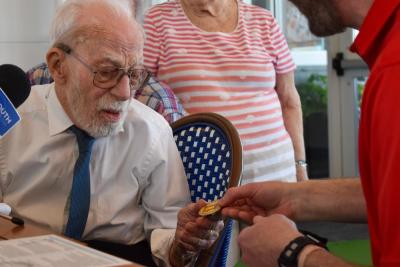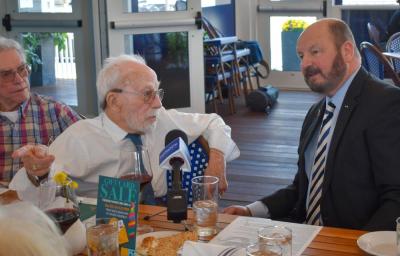‘It was my job’: Class of 1943 alum reflects on 26 years in the military
In April of 1945, the 42nd Infantry, 45th Infantry and 20th Armored Divisions were on their way to Munich, Germany when they discovered approximately 30,000 prisoners in the overcrowded Dachau concentration camp, which was one of the earliest and longest functioning control camps in Germany.
Chester Pettey, who served in the 42nd division at the time, said, “I remember Dachau being a miserable place.”
He said he recalls the “skinny prisoners in rags” and boxcars with people “hanging out — dead” and “smelly.”
Pettey said he also remembers the struggle of trying to forget about those individuals who had already died as there was nothing he could do for them and to do what he could for those who were still alive.
This was just the beginning of Pettey’s 26.5-year career in the U.S. military, serving in World War II, Korea and Vietnam. A 1943 graduate of Dartmouth High School, he and his wife have traveled from Louisiana to Dartmouth every year for the reunion.
However, due to the Covid pandemic, the Alumni Association no longer holds its traditional banquets. Instead Pettey and his wife joined the association and members of the community for lunch at The Black Whale in New Bedford.
As Pettey nears his 99th birthday, he shared with lunch attendees some of his experiences in the military.
He said when he was 9 years old, his mom took him to see a movie in Fall River that would eventually inspire him to join the military.
When Pettey was 10, he said his parents moved their family from Westport to Old Westport Road in Dartmouth and when he was 16, on Dec. 7, 1941, he heard the news about Pearl Harbor over the car radio on his way to Horseneck Beach where he spent time with his grandfather every Sunday.
He said on February 3, 1943, he and his mother took the train up to Boston where he joined the army reserve and on his 18th birthday, June 17, he received a letter in the mail stating that he must report to Fort Devens by July 1.
In just a matter of time he was completing his basic training in Alabama and completing college courses to become an electrical engineer.
Though he can’t quite recall when he finally made it to Europe, he remembers a particularly cold Christmas Eve when a woman gave him a glass of Schnapps to warm him up while he was directing traffic in a French city.
When Pettey first started out as a sergeant he said he wanted to attend the academy to become an officer, but couldn’t due to his eyesight.
However, with the help of some family contacts, when he got orders to go to Korea, he was on the list for officers and was able to receive his training.
He said his commander was “tough,” with only about half of his class graduating, but he said he was also “a good leader” with the ability to instill discipline in the prospective officers.
During the Korean War, Pettey was stationed in Japan as a combat engineer, which he said he “didn’t know anything about.”
He started off teaching at the Army Engineer School until he was called to be part of a “special forces” team that demolished bridges behind enemy lines. From there he was called in for “boots on the ground” with the 24th division.
Pettey worked his way up from second lieutenant to colonel, completing his service after Vietnam.
Select Board Chair Shawn McDonald presented him with a proclamation from the town to demonstrate their appreciation for his service. Veteran Service Officer Matthew Brouillette presented Pettey with an official citation and challenge coin from the veterans office as well as an additional coin from the Veterans Advisory Board.
Brouillette said, “It seems like today things are a lot different than what they were back then and what you did really made a difference.”
He added, “We just want to let you know that we are very appreciate of what you did and how you’ve served so honorably for so many years.”
In response to the many thanks Pettey received during lunch, he said, “It was my job.”



.jpg)














